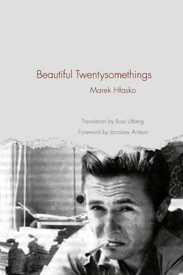 Beautiful Twentysomethings
Beautiful Twentysomethings
By Marek Hłasko
Translated by Ross Ufberg with an introduction by Jarosław Anders
Northern Illinois University Press 2013
Beautiful Twentysomethings is an engaging account of the life and times of the Polish author, Marek Hłasko, whose smoldering good looks and personal style are reminiscent of James Dean – though unlike Dean, Hłasko was a rebel with a cause. This splendid translation by Ross Ufberg retains the all energy and charm of the Polish original.
Hłasko’s irreverent memoir documents episodes from Hłasko’s life in Poland and abroad as he worked a variety of jobs (from television screenwriter to – if he is to be believed – pimp), mingled with some of the most prominent cultural figures of his generation, and found both success and frustration in literary circles with the publications of The Graveyard, Eighth Day of the Week, and Killing the Second Dog (all available in English translations).
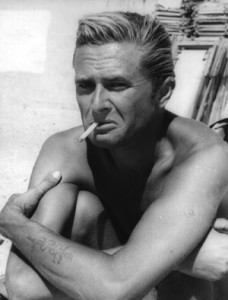
Marek Hłasko
Courtesy of the Marek Hłasko Archive
per Ross Ufberg
Photographer: Yakov Agor
An introduction by the distinguished writer and editor, Jarosław Anders, acquaints the reader with Hłasko and his extraordinary life. Hłasko, born in Warsaw in 1943, and his contemporaries – Halina Poświatowski, Andrzej Bursa, Marek Nowakowski, among others – experienced the trauma of the Second World War as very young children and knew no reality other than that of post-war communist Poland. They came of age in “the heyday of literary cabarets and politically progressive theatre.” Jazz had arrived in Poland, and with it, the draw of American “cool.” Readers are given a glimpse into Hłasko’s personal style – as noted, at times evocative of James Dean – in a series of photographs included in the publication.
After leaving Poland in 1958 on what was to be a short trip to Paris, Hłasko’s request to extend his visa was denied, and he was forced to decide between returning to Poland where he would likely be denied permission for further international travel or leaving his homeland behind. He chose to stay abroad and spent time in France, Germany, Israel, and the United States before his death in 1969. Rough, yet soulful, jaded, but not without hope of personal liberation, Hłasko’s text is a picture of its time and the adventures of its enigmatic author.
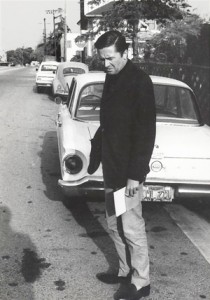
Marek Hłasko in Hollywood, California.
Courtesy of the Marek Hłasko Archive
per Ross Ufberg
Early in Beautiful Twentysomethings, Hłasko relates a conversation with a supervisor in the Young Writer’s Circle. The man told Hłasko, an aspiring writer, “if you want to write something, you have to tell it first…The point is to be able to tell it out loud,” (20). In this text, written years after that meeting, one gets the sense that Hłasko took that advice to heart, as Beautiful Twentysomethings often reads like a conversation as Hłasko leads his reader through a series of digressions, recollections, and thoughtful musings on his time. He has an ear for spoken language and throughout, his text explores the models and forces that shape the use of language.
The work is full of quotations (and misquotations), as Hłasko playfully cites pulp fiction alongside Shakespeare, Disney next to Dostoevsky. The richness of the language – preserved and alive in Ufberg’s translation – serves not only to engage the reader, but also might be read as a critique of the ways in which the individual finds himself unable to express himself in means other than the forms granted him by his society. Underlying this engaging narrative is Hłasko’s concern of whether it is possible – and if so, how – to express one’s own experience, particularly as a Polish writer removed from his native soil.
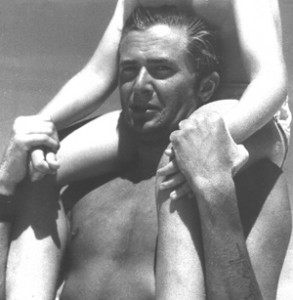
Marek Hłasko on the beach in Tel Aviv.
Courtesy of the Marek Hłasko Archive per Ross Ufberg
Photographer: Yakov Agor
While Beautiful Twentysomethings offers a searing look at the life of its author and the limits of expression, it is also an immensely entertaining who’s who of Polish culture, with Hłasko reminiscing about encounters with well-known figures of Polish culture. As a writer of some acclaim in Poland and whose works were adapted for the screen, Hłasko moved in literary and artistic circles. Readers are treated to a story of young Roman Polański falling from a tree while playing “detective” as a student in Łódź. He is mercilessly critical of film director Aleksander Ford (as well as of Jean-Luc Godard who he asserts never made a film as good as those coming from the Łódź school). Later Hłasko recalls his efforts to start a magazine with Jerzy Andrzejewski. Hłasko’s world is one populated by cultural luminaries of both his time and the past. Whether in a reference to an author from his extensive reading or in the details of a conversation with his peers, Hłasko’s text draws readers into a richly diverse world of Polish culture. For those less familiar with – and perhaps looking to learn more about – the figures and publications mentioned in Hłasko’s account, Ufberg has included a helpful glossary at the conclusion of his translation.
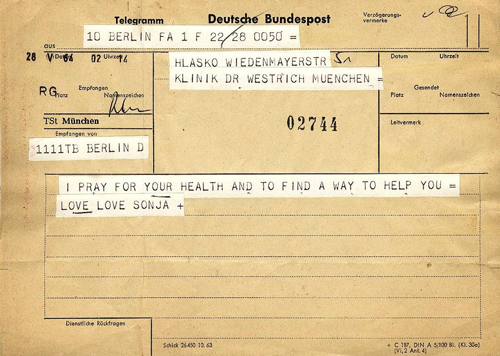
Note from Marek Hłasko’s ex-wife, Sonja Ziemann when he was in a mental hospital in Munich.
Courtesy of the Marek Hłasko Archive per Ross Ufberg
Like the people and places it describes, Beautiful Twentysomethings defies simple characterization. Hłasko revels in the complex and contradictory, describing himself at one point as “a small young man with an honest Slavic face, the kind that always lies.” This is the autobiography of that man – at once brilliantly frank and unbelievable. Hłasko is “cool,” yet his prose burns hot.
CR




Pingback: A Conversation with Joanna Trzeciak, on translating Wisława Szymborska + Tadeusz Różewicz
Pingback: Ross Ufberg and New Vessel Press
Described as autobiography it is also a view into Poland of PRL. Desperate escapes from sad reality with the help of alcohol and women, stories about cultural elite – “true fiction” as author calls it. His unique friends like Tadek Mazur, Edward Bernstein, Janek Rojewski. I just love the narration with auto-irony and sarcasm so typical for Hlasko. There is something about Hlasko prose that brings certain amount of nostalgia, that familiar feeling. The book was forbidden in Poland and published for the first time in mid-80’s. Although I’m not sure if English reader will appreciate all the nuances of the communist era Poland.
One of my favourite books right after “Eight day of the week.” Even when he writes his “Israeli stories” you can’t miss his style for anybody else.
Hłasko was born in 1934 rather than 1943.